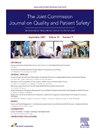Language-Concordant Health Care: Implementation of a Bilingual Competency Program
IF 2.4
Q2 HEALTH CARE SCIENCES & SERVICES
Joint Commission journal on quality and patient safety
Pub Date : 2025-06-10
DOI:10.1016/j.jcjq.2025.06.004
引用次数: 0
Abstract
Background
Language proficiency among health care professionals is essential for delivering equitable, high-quality care to patients with a non-English language preference (NELP). This study examines how implementing a Bilingual Competency Program (BCP) for diverse clinical staff enhances patient-centered care and improves the health care experience for NELP patients.
Methods
This quality improvement initiative describes implementation of the BCP at an urban cancer center. Staff self-assessed their language skills using the adapted Interagency Language Roundtable Scale for Healthcare (ILR-H) and recorded this in the organization’s human resources platform. Those self-rating as excellent attested to their proficiency and enrolled by signing an electronic statement. Those rating themselves as very good or good took an oral proficiency test. Those who passed joined the BCP, while those self-assessing as fair or poor were not included.
Results
A total of 935 employees joined the program, representing 1,087 unique language entries across 67 languages, with Spanish, Mandarin, Russian, and Hindi being most common. Out of 1,087 unique entries, 641 (59.0%) self-assessed as excellent, 269 (24.7%) as very good (75.0% of whom [60/80] passed the proficiency test), and 130 (12.0%) as good (58.8% of whom [20/34] passed). Most participants (71.8%) were in patient-facing roles, and 68.7% held clinical positions. Of 1,087 unique entries, 721 (66.3%) were verified for language proficiency, 641 through self-assessment and 80 through formal testing.
Conclusion
The BCP enhances linguistic competency by integrating validated assessments and evidence-based methods, addressing prior program limitations, and setting a new standard for improving health equity, care quality, and outcomes for NELP patients.
语言一致的卫生保健:双语能力计划的实施。
背景:卫生保健专业人员的语言能力对于向非英语语言偏好(NELP)的患者提供公平、高质量的护理至关重要。本研究探讨如何在不同的临床工作人员中实施双语能力计划(BCP),以加强以患者为中心的护理,并改善NELP患者的医疗保健体验。方法:本质量改进倡议描述了BCP在城市癌症中心的实施情况。工作人员使用经过调整的医疗保健机构间语言圆桌量表(ILR-H)自我评估其语言技能,并将其记录在组织的人力资源平台中。那些自我评价为优秀的人通过签署一份电子声明来证明他们的熟练程度。那些认为自己很好或很好的人参加了口语水平测试。那些通过考试的人加入了BCP,而那些自我评价为“一般”或“差”的人不包括在内。结果:共有935名员工加入了该项目,代表了67种语言的1,087种独特语言条目,其中西班牙语、普通话、俄语和印地语最为常见。在1087个独立条目中,641个(59.0%)自评为优秀,269个(24.7%)自评为非常好(其中75.0%[60/80]通过了能力测试),130个(12.0%)自评为良好(其中58.8%[20/34]通过了)。大多数参与者(71.8%)是面向患者的角色,68.7%是临床职位。在1,087个唯一条目中,721个(66.3%)通过语言能力验证,641个通过自我评估,80个通过正式测试。结论:BCP通过整合有效的评估和基于证据的方法来提高语言能力,解决了先前的项目限制,并为改善NELP患者的健康公平、护理质量和结果设定了新的标准。
本文章由计算机程序翻译,如有差异,请以英文原文为准。
求助全文
约1分钟内获得全文
求助全文
来源期刊

Joint Commission journal on quality and patient safety
HEALTH CARE SCIENCES & SERVICES-
CiteScore
3.80
自引率
4.30%
发文量
116
审稿时长
49 days
 求助内容:
求助内容: 应助结果提醒方式:
应助结果提醒方式:


